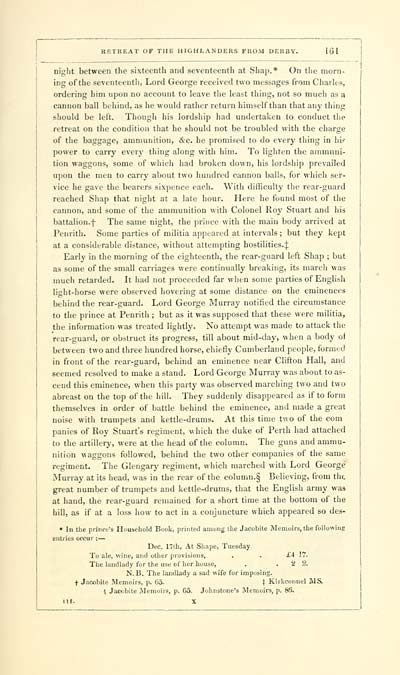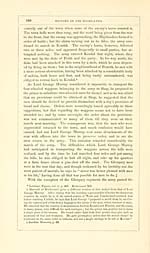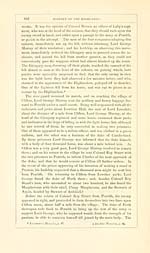Download files
Complete book:
Individual page:
Thumbnail gallery: Grid view | List view

RETREAT OF THE HIGHLANDERS FROM DERBY. IGI
night between the sixteenth and seventeenth at Shap.* On the morn-
ing of the seventeenth, Lord George received two messages from Charlis,
ordering him upon no account to leave tlie least thing, not so much as a
cannon ball behind, as he would ratliur return himself than that anj' thing
should be left. Though his lordship had undertaken to conduct the
retreat on the condition that he should not be troubled with the charge
of the baggage, ammunition, &c. he promised to do every thing in hi?
power to carry every thing along with him. To lighten the ammtini-
tion waggons, some of which had broken down, his lordship prevailed
upon the men to carry about two hundred cannon balls, for which ser-
vice he gave the bearers sixpence each. With difficulty the rear-guard
reached Shap that night at a late hour. Here he found most of the
cannon, and some of the ammunition with Colonel Roy Stuart and his
battalion.f The same night, the prince with the main body arrived at
Penrith. Some parties of militia appeared at intervals ; but they kept
at a considerable distance, without attempting hostilities.^
Early in the morning of the eighteenth, the rear-guard left Shap ; but
as some of the small carriages were continually breaking, its march was
much retarded. It had not proceeded far when some parties of English
light-horse were observed hovering at some distance on the eminences
behind the rear-guard. Lord George Murray notified the circumstance
to the prince at Penrith ; but as it was supposed that these were militia,
the information was treated lightly. No attempt was made to attack the
rear-guard, or obstruct its progress, till about mid-day, when a body o(
between two and three hundred horse, chietly Cumberland people, formed
in front of the rear-guard, behind an eminence near Clifton Hall, and
seemed resolved to make a stand. Lord George Murray was about to as-
cend this eminence, when this party was observed marching two and two
abreast on the top of the hill. They suddenly disappeared as if to form
themselves in order of battle behind the eminence, and made a great
noise with trumpets and kettle-drums. At this time two of the com
panies of Roy Stuart's regiment, which the duke of Perth had attached
to the artillery, were at the head of the column. The guns and ammu-
nition waggons followed, behind the two other companies of the same
regiment. The Glengary regiment, which marched with Lord George
Murray at its head, was in the rear of the column. § Believing, from the
great number of trumpets and kettle-drums, that the English army was
at hand, the rear-guard remained for a short time at the bottom of the
hill, as if at a loss how to act in a conjuncture which appeared so des-
» In the prince's Houseliold Book, primed among llie Jacobite Jlemoirs, Uie followinc
entries occur : —
Dec. nih, At Slmpe, Tuesday
To ale, wine, and other provisions, . . £4 17.
The landlady for the use of her house, . .2 2.
N. B. The landlady a sad wife for imposing.
t Jncohite ."Memoirs, p. 65. i Kirkconnel MS.
t Jacobite Jlemoirs, p. 65. Johnstone's Memoirs, p. 86.
night between the sixteenth and seventeenth at Shap.* On the morn-
ing of the seventeenth, Lord George received two messages from Charlis,
ordering him upon no account to leave tlie least thing, not so much as a
cannon ball behind, as he would ratliur return himself than that anj' thing
should be left. Though his lordship had undertaken to conduct the
retreat on the condition that he should not be troubled with the charge
of the baggage, ammunition, &c. he promised to do every thing in hi?
power to carry every thing along with him. To lighten the ammtini-
tion waggons, some of which had broken down, his lordship prevailed
upon the men to carry about two hundred cannon balls, for which ser-
vice he gave the bearers sixpence each. With difficulty the rear-guard
reached Shap that night at a late hour. Here he found most of the
cannon, and some of the ammunition with Colonel Roy Stuart and his
battalion.f The same night, the prince with the main body arrived at
Penrith. Some parties of militia appeared at intervals ; but they kept
at a considerable distance, without attempting hostilities.^
Early in the morning of the eighteenth, the rear-guard left Shap ; but
as some of the small carriages were continually breaking, its march was
much retarded. It had not proceeded far when some parties of English
light-horse were observed hovering at some distance on the eminences
behind the rear-guard. Lord George Murray notified the circumstance
to the prince at Penrith ; but as it was supposed that these were militia,
the information was treated lightly. No attempt was made to attack the
rear-guard, or obstruct its progress, till about mid-day, when a body o(
between two and three hundred horse, chietly Cumberland people, formed
in front of the rear-guard, behind an eminence near Clifton Hall, and
seemed resolved to make a stand. Lord George Murray was about to as-
cend this eminence, when this party was observed marching two and two
abreast on the top of the hill. They suddenly disappeared as if to form
themselves in order of battle behind the eminence, and made a great
noise with trumpets and kettle-drums. At this time two of the com
panies of Roy Stuart's regiment, which the duke of Perth had attached
to the artillery, were at the head of the column. The guns and ammu-
nition waggons followed, behind the two other companies of the same
regiment. The Glengary regiment, which marched with Lord George
Murray at its head, was in the rear of the column. § Believing, from the
great number of trumpets and kettle-drums, that the English army was
at hand, the rear-guard remained for a short time at the bottom of the
hill, as if at a loss how to act in a conjuncture which appeared so des-
» In the prince's Houseliold Book, primed among llie Jacobite Jlemoirs, Uie followinc
entries occur : —
Dec. nih, At Slmpe, Tuesday
To ale, wine, and other provisions, . . £4 17.
The landlady for the use of her house, . .2 2.
N. B. The landlady a sad wife for imposing.
t Jncohite ."Memoirs, p. 65. i Kirkconnel MS.
t Jacobite Jlemoirs, p. 65. Johnstone's Memoirs, p. 86.
Set display mode to: Large image | Transcription
Images and transcriptions on this page, including medium image downloads, may be used under the Creative Commons Attribution 4.0 International Licence unless otherwise stated. ![]()
| Early Gaelic Book Collections > Ossian Collection > History of the Highlands and of the Highland clans > Volume 3 > (191) |
|---|
| Permanent URL | https://digital.nls.uk/79654714 |
|---|
| Description | Vol. III. |
|---|---|
| Shelfmark | Oss.249 |
| Attribution and copyright: |
|
| Description | Selected books from the Ossian Collection of 327 volumes, originally assembled by J. Norman Methven of Perth. Different editions and translations of James MacPherson's epic poem 'Ossian', some with a map of the 'Kingdom of Connor'. Also secondary material relating to Ossianic poetry and the Ossian controversy. |
|---|
| Description | Selected items from five 'Special and Named Printed Collections'. Includes books in Gaelic and other Celtic languages, works about the Gaels, their languages, literature, culture and history. |
|---|

